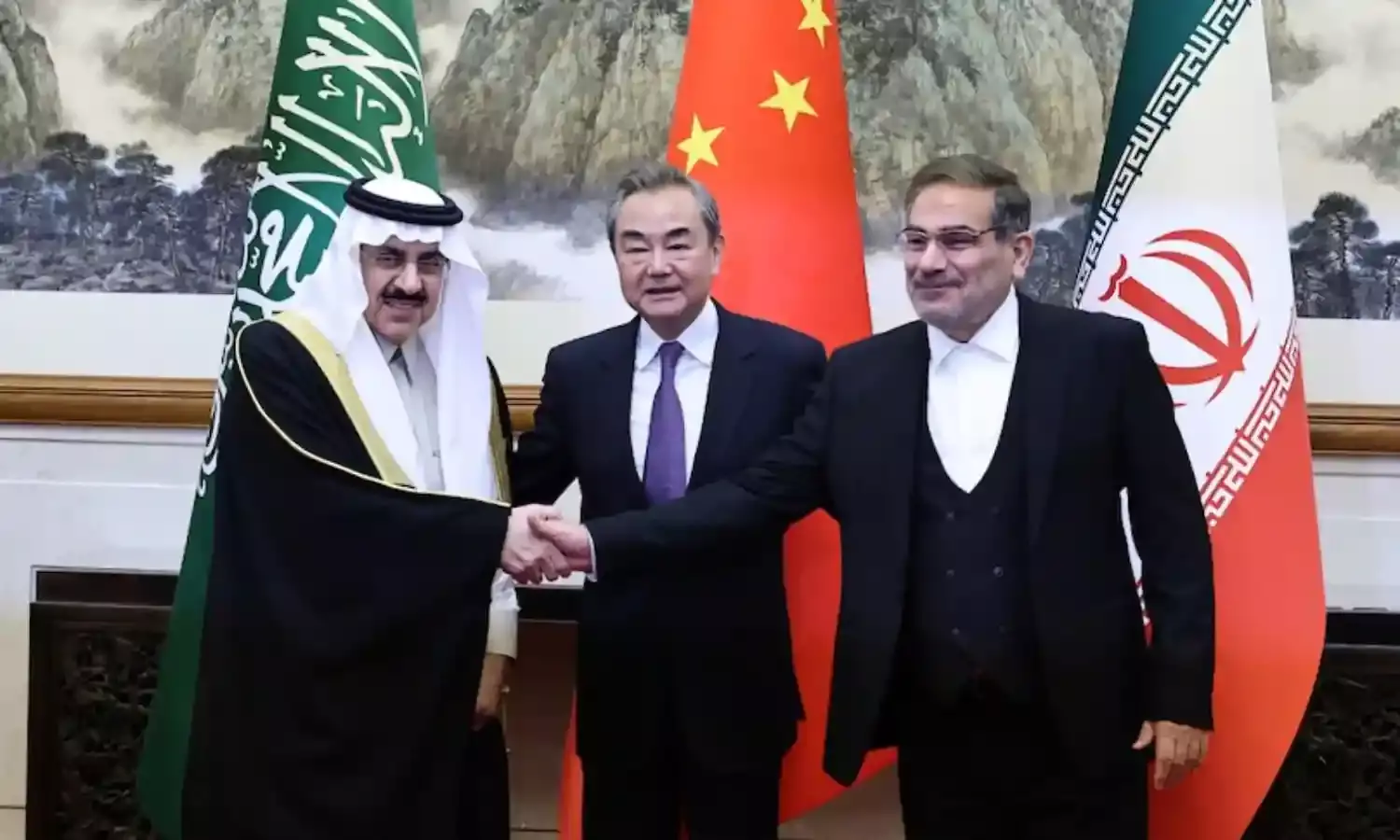Saudi Arabia & Iran Sign China Into the Top Slot, US On The Wane
World astounded

China has astounded the world with its peace diplomacy, a first effort that has brought warring Saudi Arabia and Iran on the same table. The divisive, fluctuating American policy in the Middle East has been finally shown up as the respective Sunni and Shia bastions in the region have agreed to bury differences and shake hands, watched over by a smiling China. The impact has been electrifying, and with reason as this could mark the beginning of a shift in world order. Polarity and multipolarity apart, this shake of hands has for the moment at least, sparked off speculation of changes across the world. More so as Saudi Arabia - despite the Biden hypocrisy over the Adnan Khashoggi murder– seems to have moved away from the US and Israel stranglehold towards a relationship that can bring an end to wars in the region and change the power equations entirely.
China that has remained a trade partner of both Saudi Arabia and Iran, and a major buyer of oil, started the peace mediation process without word getting out. The first the world heard of this was when the agreement restoring diplomatic relations between the two rivals was signed. Both signed off on a “respect for the sovereignty of states and noninterference in their internal affairs”, and agreed to revive a security cooperation pact that had lapsed over the years of bitter warring. The agreement has established host China as a major economic and political force in the world today, no longer emerging but arrived.
In the region the immediate impact will be on Yemen where Tehran backed Houthis have been withstanding Saudi military might for eight long years. The death and destruction has been endless as the people of Yemen united to keep their country alive. This war will now end, or should completely end, as the first test of this agreement.
The second country to feel the heat as it were will be Israel that had been working to establish direct relations with Saudi Arabia, with US brokering of course. In the back and forth, Israel remained confident from what appeared in its media, that the Saudis would move ahead and establish solid relations with Tel Aviv, leading to the further isolation of Iran. In fact Benjamin Netanyahu has stated so repeatedly, that he would seal diplomatic relations with Riyadhi very soon. This unexpected agreement with the not very friendly China in the middle will have come as a shock to the Israeli government, and it will be interesting to see whether there will be any immediate let up in the brutal Israel attack on the Palestinians for the past several weeks. More so, as Iran’s position on Israel has remained pretty undiluted and as the agreement is put in place and implemented, it is likely to bring the Saudi’s back on track.
The US of course stands more exposed than any other in these developments. The Biden foreign policy is in tatters as the US domination over the Middle East is clearly on the wane. Washington’s relations with Riyadh have deteriorated after the Khashoggi murder, with Biden bowing to public opinion and building a slight distance, then rushing to embrace the Saudis yet again when the oil prices peaked, and then finding that despite the love Saudi Arabia had taken measures to keep the oil price elevated. China on the other hand has moved in quietly through its economic and trade policies, and established a degree of trust that has the Saudi’s agreeing to resume relations with Iran.
Biden has also not been able to follow up on the agreement signed by his Democratic predecessor Barack Obama with Iran. And for reasons best known to his advisors decided to go the Trump way, and accept the freeze in relations with Tehran. The result is that Iran, according to US media reports, has moved ahead on its nuclear program and even if this is true or not, remains hostile to Washington. Its policies towards nations in the Middle East have been very different than Saudi Arabia, although the Arab street seems to have concurred more with Iran than Saudi Arabia on matters of foreign policy – starting with the US invasion of Iraq. The rapprochement will have an impact on Saudi policy that swerved between silence and open support for Washington on all such issues.
The world will speculate whether the agreement to end the seven year feud, and open embassies in each others capitals within two months, will last and yield positive results. Iran and Saudi Arabia officials have had some talks in the past, a sign that both are keen to end hostilities. And China has been trusted and accepted by both to take this forward. There have been high level visits - Iran;s President Ebrahim Raisi was in Beijing just a month ago and China’s supreme leader Xi Jinping visited Riyadh late last year. It is clear that Beijing will continue to monitor the relationship between the two countries and play an important role in cementing it. More so as both rivals stand to gain from it in terms of sovereignty and freedom.



